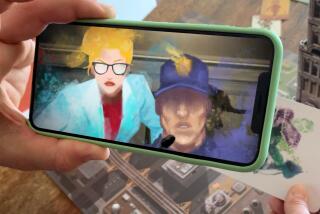The Player: ‘Rise of Tomb Raider’ excels in peripheral puzzles
- Share via
The Lara Croft of “Rise of the Tomb Raider” may believe in fairy tales, but that doesn’t mean she’s willing to put up with nonsense.
Early on a man who, like most men in this retooled take on the classic adventuring archaeologist, is viewed with general distrust. He tells Croft that she isn’t likely to survive the vast ancient ruins of the game sans his help. “You won’t get far without me,” he says. Croft doesn’t miss a beat.
“You don’t know how far I’ve come,” she says, proving as adept with a put-down as she is with an arrow and a bullet.
SIGN UP for the free Classic Hollywood newsletter >>
One of gaming’s great surprises in recent years is indeed just how far Lara Croft has come, shedding her late-’90s image as eye candy in a catacomb to the fully realized character she is today. Once a symbol for how gaming accentuated a woman’s features for a male audience, the Croft of 2015 is as worthy a hero as Furiosa in “Mad Max: Fury Road.”
The Croft of “Rise of the Tomb Raider” is intelligent, stubborn, complicated, empathetic and a heck of a good shot. She’s as consumed with rare artifacts as she is her own demons, a character with supreme intellect and superpower-like abilities who still manages to feel human.
She no longer hesitates when having to pull a trigger to save her life, but she cringes a little when having to skin a bear. She has no problem buying into the idea that there could be a source for everlasting life, but she has little patience for the consoling words of a therapist-for-hire.
Ultimately, as the follow-up to the 2013 reboot of “Tomb Raider,” “Rise of the Tomb Raider” puts the emphasis where it should: on Croft the explorer. There’s plenty of gunplay, but duck-and-shoot action is not where the game excels.
No, it’s the journey to hidden ledges behind waterfalls, into abandoned mines and across faulty bridges to rocky cliffs to reach the top of tower ruins. “Rise of the Tomb Raider” is as much about Croft versus the elements as it as her archaeological foes, in this case religious zealots who want their hands on a Holy Grail-like artifact to build God’s immortal army.
Plot-wise, the backbone of the story is “Indiana Jones and the Last Crusade,” with a terrorist organization standing in for Nazis. Overall, it’s more logical than the 2013 “Tomb Raider,” which was hampered slightly by a convoluted story about using weather as a weapon. That game also lacked many notable tombs to raid, which has been remedied to great effect here.
The strongest moments in “Rise of the Tomb Raider,” in fact, are in its tombs. These stand apart from the core story and are optional to complete. With little exception, the main narrative largely has players engaging in battles of stealth and gunplay. The tombs, however, break up the action with some of the game’s most majestic locales and almost all of its brainteasers.
The settings — curved bridges, glacial waterfalls, swampy crypts — are the setups for occasionally vexing challenges that have Croft manipulating the environment to get from Point A to Point B. The payoff is usually worth it, as completing a tomb often earns Croft vital skills to surviving the game’s more action-oriented elements. The more time I spent with “Rise of the Tomb Raider,” the more I put off completing the game’s narrative because I came to dread the moments when Croft had to use a gun rather than her smarts.
When we meet Croft, she’s amid an existential crisis. Her late father has been discredited by academics and archaeologists alike for believing in the supernatural, yet after the fantastical events of the 2013 game, Croft finds herself increasingly consumed with the very facets that forced her father to be an absentee dad.
Like her father, Croft is struggling to not push everyone in her life away and completely isolate herself. The game arguably overrelies on these unresolved issues, yet they do illustrate that Croft has a soft spot for her friends and family, and the game’s evil forces, known as Trinity, learn how to exploit this and worm their way into Croft’s life. “Just a frightened little girl trying to walk in her daddy’s shoes,” a Trinity leader scoffs at Croft, and thus the game becomes personal.
As the game progresses, Croft becomes ridden with guilt and starts to call into question her very quest for a source of everlasting life. Her initial motivations were pure naiveté, believing, in part, that such an artifact could rid the world of illness and war. But it’s her research that has led Trinity from Syria to the Siberian wilderness and innocent locals are caught in the fray.
Inward crisis or not, to adventure with Croft is such a joy — to swing from a branch, to jump from broken bridges, to climb down into abandoned caverns or to traverse rooftops of an abandoned ice city — that the story becomes an excuse to stay out in the wild.
“There’s no us,” Croft sneers when one of the game’s characters wonders how the two of them will get out of a tricky predicament alive. Indeed, I often wanted all of them to disappear — Trinity, the locals, everyone. Croft, after all, wasn’t talking about the player, and the two of us had underwater burial sites to exhume.
------------
“Rise of the Tomb Raider”
Developer: Crystal Dynamics
Publisher: Microsoft
Platforms: Xbox One (reviewed), Xbox 360
Release date: Tuesday
Price: $59.99
More to Read
The biggest entertainment stories
Get our big stories about Hollywood, film, television, music, arts, culture and more right in your inbox as soon as they publish.
You may occasionally receive promotional content from the Los Angeles Times.











